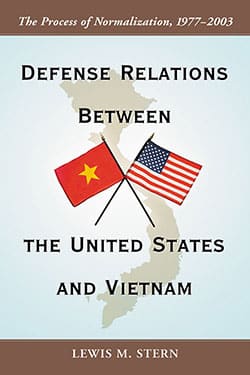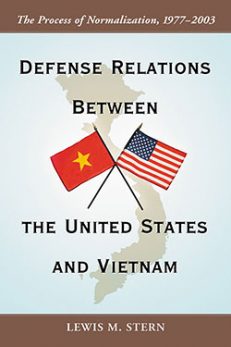Defense Relations Between the United States and Vietnam
The Process of Normalization, 1977–2003
$29.95
In stock
About the Book
Although the hostilities of the Vietnam War ended in 1975, the diplomatic repercussions lasted for several more decades. Eventually, however, the dedicated perseverance of diplomats on both sides paid off. In November 2003, Major General Pham Van Tra, defense minister of the Socialist Republic of Vietnam, met with U.S. defense secretary Donald Rumsfeld in the halls of the Pentagon, signaling a new era in U.S.–Vietnamese defense relations.
This book traces the development of that relationship in the years since the Vietnam War. It focuses especially on the 1990s, a decade in which the author served as country director for Indochina, Thailand and Burma in the Office of the Assistant U.S. Secretary of Defense for International Security Affairs. His experience adds a personal perspective to the historical and political record. Multiple facets of the relationship between the two countries are addressed, including trade, immigration of Amerasian children, and POW-MIA concerns. Through this honest depiction of the sometimes fractious and confusing policy-making process, Stern shows how both parties came to agree, in the words of Major General Tra, that we “should not allow the future to repeat the past.”
About the Author(s)
Bibliographic Details
Lewis M. Stern
Format: softcover (6 x 9)
Pages: 298
Bibliographic Info: notes, bibliography, index
Copyright Date: 2005
pISBN: 978-0-7864-2168-8
eISBN: 978-1-4766-1129-7
Imprint: McFarland
Table of Contents
Preface 1
1. Exploring New Foundations, 1977–1993 7
2. Stumbling Toward a Relationship, 1994–1995 36
3. Building Defense Ties, 1995 69
4. Making Military Contacts, 1996 93
5. Ground Floor Military Relations, 1997 124
6. Making Defense Relations Work, 1998 161
7. Nudging Things Along, Muddling Towards Dénouement, 1999–2000 189
8. Conclusions, Observations, Musings 221
Notes 245
Bibliography 271
Index 287
Book Reviews & Awards
- “Should be required reading for every advanced class in international relations…meticulous”—Foreign Service Journal.





